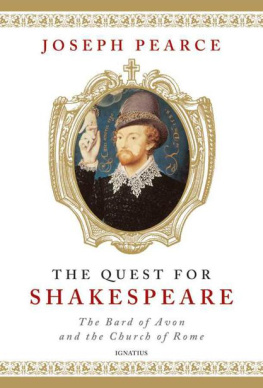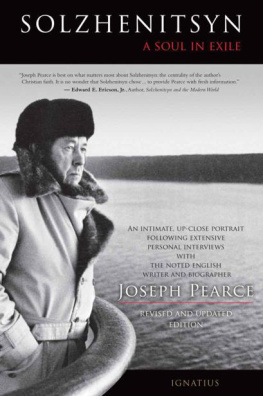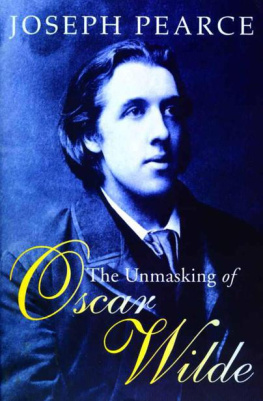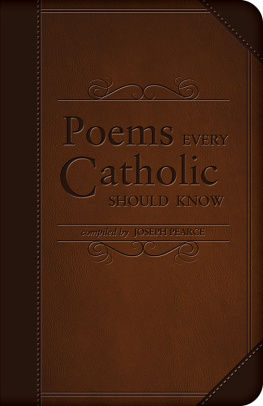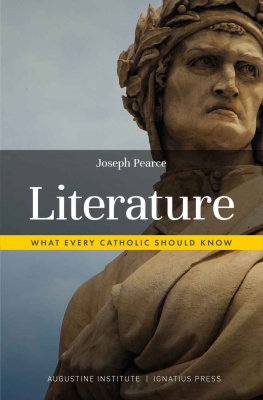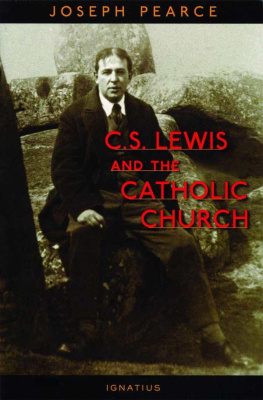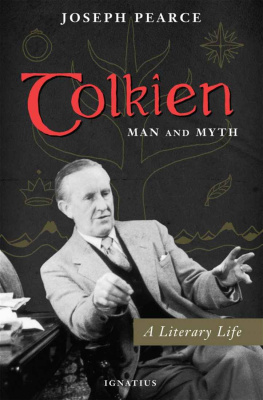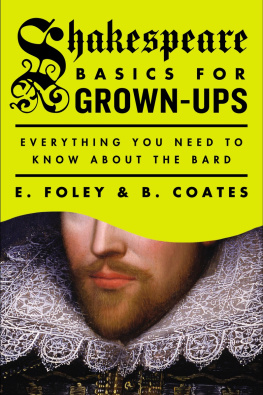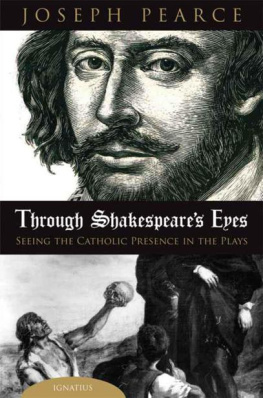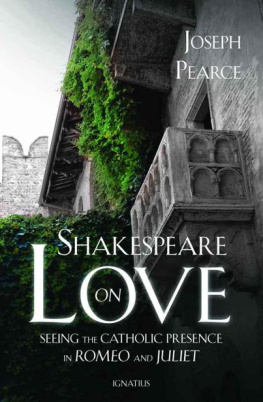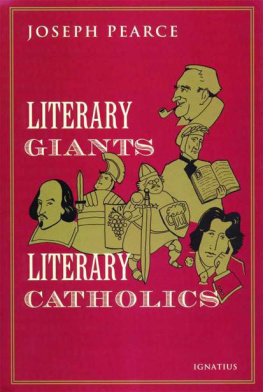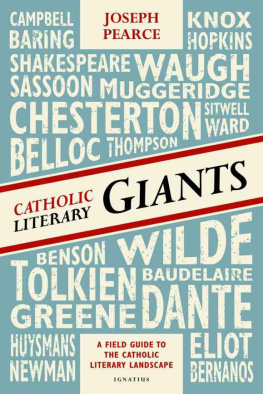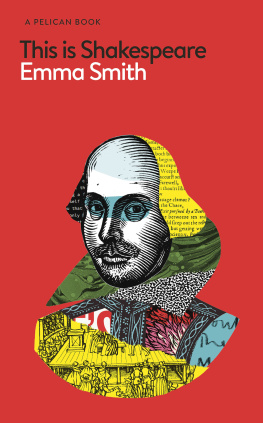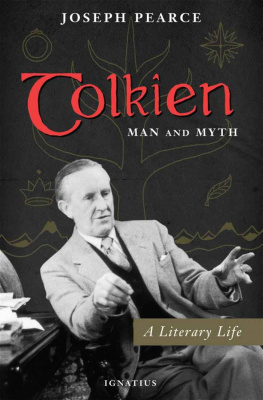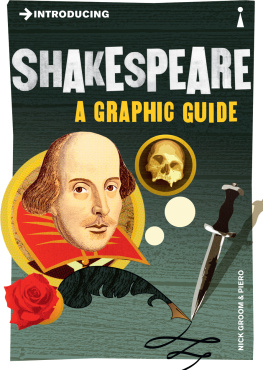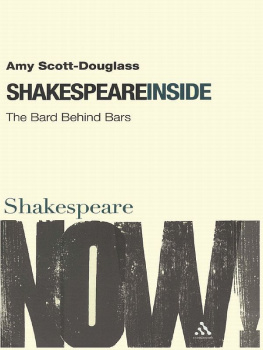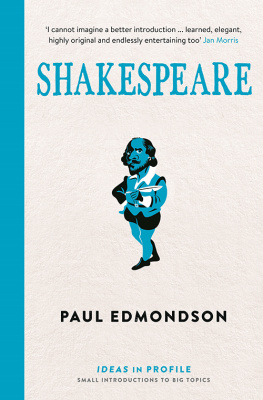THE QUEST FOR SHAKESPEARE
JOSEPH PEARCE
THE QUEST FOR SHAKESPEARE
IGNATIUS PRESS SAN FRANCISCO
Cover art:
Nicholas Hilliard, Man Holding a Hand from a Cloud (miniature)possibly
William Shakespeare, 1588. Victoria and Albert Museum, London
Photo Credit:
Victoria & Albert Museum, London / Art Resource, N.Y.
Cover design by John Herreid
2008 Ignatius Press, San Francisco
All rights reserved
ISBN 978-1-58617-224-4
Library of Congress Control Number 2007928877
Printed in the United States of America
For
Albert Arthur Pearce
1930-2005
The Last of England
CONTENTS
PREFACE
The quest pursued in the following pages is designed to show objectively who Shakespeare was, and what his deepest beliefs were. We will be dealing solely with the facts, and I ask the reader to expect that all suppositions be founded upon, be subject to, and be judged from the perspective of the facts presented. If, in any of the proceeding pages, this is not the case, I will consider myself to blame for a failure in scholarship. I will add, however, that the following work also represents a quest in the subjective as well as in the objective sense. It has been, for the author, a true enlightenment. I began as a skeptic, doubting that there was sufficient biographical evidence to know who Shakespeare was, or what he believed, excepting of course what could be adduced from his work. I was particularly skeptical of those who claimed that Shakespeare was a Catholic, dismissing the arguments of those Catholics who made such claims as mere wishful thinking. I was convinced that the only honest position was one of agnosticism because not enough was known about Englands greatest poet to come to any definitive conclusions. Such was my position.
It was only slowly that I came to realize that much more was known about Shakespeare than most of us have been led to believe. One fact followed upon another until a point was reached where I decided to embark upon some serious research myself. Doing so, I became convinced that Shakespeare was indeed a Catholic, at a time when Catholics were subject to a great deal of ruthless persecution, and that this fact has radical consequences with regard to the study of his works.
In chapter 1, and in greater depth in appendix A, I have alluded to, or sketched, what might be termed a philosophy of the creative process that is needed to read Shakespeare or indeed any text objectively. It is rightly called a philosophy as opposed to a literary theory because the ratio underpinning it is not a theory but a demonstrable truth. I have not succumbed to the radical relativism, in its various theoretical guises, that has possessed the study of literature in the Academy, but have insisted that literary criticism is a discipline, as opposed to an art, which needs to subject itself to the objective authority of the Author. I have not denied nor belittled the transcendent nature of creativity, though I insist that such transcendence is itself inseparable from, and incarnated in, the personhood of the author and needs to be seen as such. This authorialism, for want of a better label, is necessary for the restoration of sanity in the field of Shakespeare studies and in the wider field of literary criticism itself. Needless to say, I have not been able to elucidate this philosophy at any great length within the confines of this particular study, but intend to return to it at greater length when time and opportunity permit. In the interim, I trust and believe that I have demonstrated the philosophy adequately for the purposes of this work.
I am also painfully aware that the quest is not yet completed.
Although this work assembles the considerable body of biographical and historical evidence that points to Shakespeares Catholicism, the quest will not be completed successfully until the considerable body of textual evidence for his Catholicism is assembled also. This is a much larger undertaking, since it will necessitate a close reading of the plays and poems, in the light of his known Catholicism. It was, however, necessary to complete the biographical and historical aspects of the quest first. If, instead, we had begun with the text, presuming Shakespeares Catholicism, we could be accused, justifiably, of reading into the works what we want to see. Establishing Shakespeares bona fides enables the scholar to establish his own bona fides, rooted in indisputable fact, and thereby allows him to avoid the pitfalls of relativism into which most Shakespeare criticism has fallen.
I hope to embark on the second part of the quest myself in the near future, writing another book examining the textual evidence for the Bards Catholicism that can be found in the plays and poems. As a foretaste of this later study, I have included an essay on King Lear (appendix B) that shows how our knowledge of the playwrights religious faith and philosophy permits us to read the plays through the eyes of the playwright himself. Reading the plays through Shakespeares eyes is not merely enlightening, but is an adventure in the presence of genius. The second part of the quest promises to be even more thrilling than the first!
ACKNOWLEDGMENTS
I am deeply indebted to many friends and colleagues for their assistance in manifold ways during the research and writing of this volume. Henry Russell, R. A. Benthall, Aaron Urbanczsyk, Andrew Moran, Travis Curtwright, Peter Milward, S.J., Michael Sugrue, and R.V. Young all offered their help, as did my friends, Al Kresta and Marcus Grodi, both of whom lent me rare tomes from their personal libraries to aid me in my research. Peter Kreeft and Thomas Howard offered me invaluable practical support, and I have no doubt that this volume would have been considerably weaker had it not benefited from their inestimable advice. I am indebted indeed!
Members of the library staff at Ave Maria University have tirelessly buttressed my labors, and I must thank the powers-that-be at Ave Maria University for facilitating the writing of this book. Father Joseph Fessio and his colleagues at Ignatius Press continue to support my work, and I remain grateful for all that they have done and are doing to promote my books. Im also grateful for the editors at Ediciones Palabra in Spain for their own efforts to make this and others of my work available to the Spanish-speaking world.
It would be somewhat remiss of me to fail to acknowledge the scholarly pioneers who have laid the path along which the present study has trod. As such, I doff my cap in the direction of my illustrious forebears while refraining from listing them by name here. Suffice to say that a perusal of the bibliography at the end of this volume will identify those scholars upon whose shoulders I have stood in order to gain the perspective contained herein.
My wife, Susannah, has read every chapter, as it has been written, and I am grateful for her sagacity and for her efforts, not always successful, to curb the acerbic excesses of my pen. She has sought to steer my robust Muse in the direction of Chestertonian charity and away from Bellocian bellicosity but oft times in vain. And though, indeed, I make no apology for my robust approach, if I have sinned in these pages against charity it will not be the fault of my greatest and dearest critic.
The ultimate acknowledgment belongs to my father, Albert Arthur Pearce, who introduced me to Shakespeare when I was only knee-high and who could recite, by heart, whole soliloquies from the plays. There can have been few greater admirers of Englands greatest poet than was my father, and, since his enthusiasm was contagious, I have him to thank for my own passion for the Bard. Of all my books, and he read them all with paternal loyalty, none filled my father with as much excited expectancy as my promised book on Shakespeare. Alas, the promise was not fulfilled before his death but is offered to him posthumously in gratitude for the abundant gifts he has bestowed upon me, not least of which is my love of good literature. It is, therefore, to Albert Arthur Pearce that this book is dedicated.
Next page
